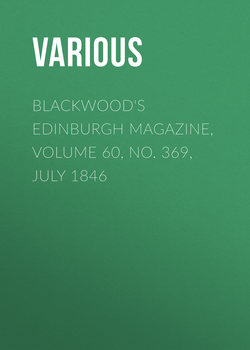Blackwood's Edinburgh Magazine, Volume 60, No. 369, July 1846

Реклама. ООО «ЛитРес», ИНН: 7719571260.
Оглавление
Various. Blackwood's Edinburgh Magazine, Volume 60, No. 369, July 1846
PERU.1
LETTERS ON ENGLISH HEXAMETERS
MARLBOROUGH'S DISPATCHES
THE AMERICANS AND THE ABORIGINES
THE DEATH OF ZUMALACARREGUI
NEW SCOTTISH PLAYS AND POEMS.53
ELINOR TRAVIS
MORE ROGUES IN OUTLINE
THE LAST RECOLLECTIONS OF NAPOLEON.62
Отрывок из книги
Dear Mr Editor – I perceive, by your having requested a second specimen of N.N.T.'s English hexameters, that you feel an interest in the question, whether that form of verse can be successfully employed in our language. Certainly the trial has never yet been made under any moderate advantages. Sidney, and the other Elizabethans, in their attempts, hampered themselves with Latin rules of the value of syllables, which the English ear refuses to recognise, and which drive them into intolerable harshness of expression and pronunciation. Stanihurst's Virgil is so laboriously ridiculous in phraseology, that every thing belonging to it is involved in the ridicule. Southey's Vision is a poem so offensive in its scheme, that no measure could have made it acceptable. Yet the beginning of that poem is, as you, Mr Editor, have remarked, a very happy specimen of this kind of verse; and would, I think, by a common English reader, be admired, independently of classical rules and classical recollections. Now, if we can reach this point, and at the same time give a good English imitation of the Epic mode of narration in Homer, we shall have a better image of Homer in our language than we yet possess. Your contributor appears to me to have advanced a good way towards the execution of this kind of work; and I should be glad if he, or you, would allow me, as a reader of English hexameters, to offer a few remarks on his first book of the Iliad, with a view to point out what appear to me the dangers and difficulties of the task. I do not say any thing of my general admiration of N.N.T.'s version, for mere praise you would hardly think worth its room.
I should be glad to discuss with you, Mr Editor, the objections which are usually made to English hexameters. There is one of these objections which I will say a few words about at present. It proceeds upon a misapprehension, now, I hope, pretty generally rectified; I mean the objection that we cannot have hexameters, "because we have so few spondees the language." Southey says we have but one, Egypt; and gives this as a reason why the spondees of classical hexameters are replaced by trochees in German and English. As to Southey's example, Egypt is no more a spondee than precept or rescript; but the fact is, that we have in English spondees in abundance; and these spondees have tended more than any thing else to spoil our hexameters. The universal English feeling of rhythm rejects a spondee at the end of the verse; and if the syllables there placed are such as would, in the natural course of pronunciation, form a spondee, we nevertheless force upon them a trochaic character. This may be worth proving. Read, then, the following lines of Sidney: —
.....
Except you prefer to read it thus —
which is no better. Perhaps the worst of Southey's lines in this way is this —
.....